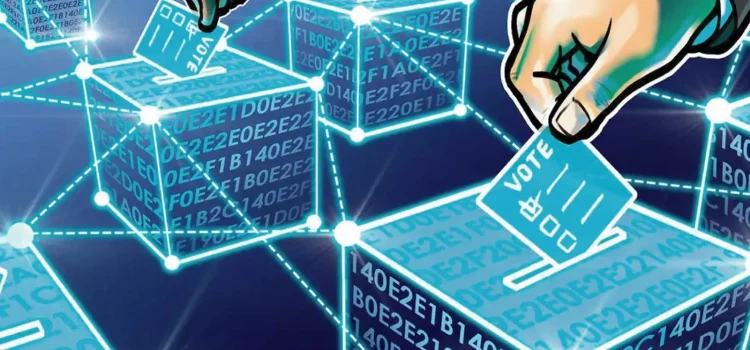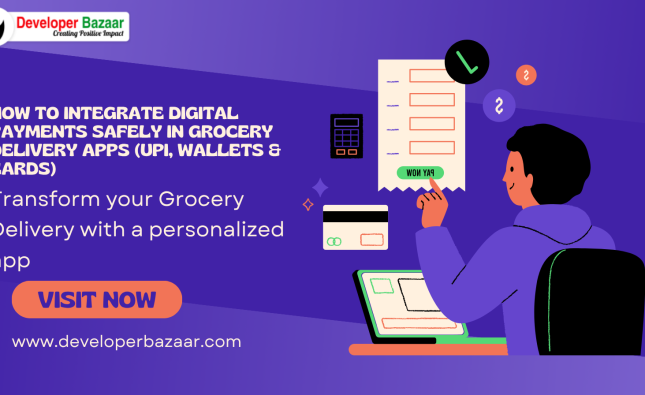
Online voting has long been a vision of the future—convenient, accessible, and seemingly effortless. But despite significant technological advances, the idea of secure and widespread online voting has faced skepticism and barriers. Enter blockchain technology. Known for powering cryptocurrencies like Bitcoin, blockchain offers decentralized, secure, and transparent solutions that could redefine the way we vote.
This blog explores how blockchain is transforming the online voting landscape. From the limitations of traditional systems to real-world examples of blockchain voting, and even recommendations for adopting this technology, we’ll uncover its potential to deliver secure, accessible, and trustworthy elections.
Introduction to Blockchain Technology

Before diving into online voting, we need to first unpack blockchain technology. Simply put, blockchain is a decentralized, immutable ledger of transactions spread across a network. Each “block” contains data (like votes) locked together in an encrypted chain, ensuring that once a transaction occurs, it cannot be altered or removed.
Key features of blockchain include:
- Transparency: All transactions are visible to authorized participants.
- Security: Data is encrypted and protected by consensus mechanisms.
- Decentralization: There’s no single point of failure as data is distributed across nodes.
What started as a financial tool for cryptocurrencies is now expanding its impact into industries like healthcare, logistics, and yes—voting.
The Evolution of Online Voting
Online voting wasn’t born yesterday. Governments and agencies have experimented with digitized ballots over the last two decades. Estonia led the charge in 2005, becoming the first country to allow its citizens to vote online in national elections. Since then, other countries, including Switzerland and Canada, have dipped their toes in online voting.
However, scaling online voting to secure large-scale elections has proven to be a challenge. While it conquers the logistical hurdles of traditional voting, such as cost and accessibility, it introduces a host of new digital vulnerabilities.
Challenges in Traditional Online Voting Systems
Why hasn’t online voting become mainstream? Here are the critical challenges of traditional systems that blockchain aims to address:
1. Security Risks
Hackers and cyberattacks pose a significant threat to conventional online voting systems. A compromised server can result in tampered results, identity theft, or voter manipulation.
2. Lack of Transparency
How can voters trust their votes are accurately counted or that the election is free from bias? Without proper transparency mechanisms, skepticism looms large.
3. Centralization
Traditional voting systems are often centralized, meaning they rely on a single server. This creates a vulnerability where one point of failure could disrupt the entire system.
4. Voter Accessibility
Not all citizens have equal access to secured voting mechanisms. Problems of inclusivity and authentication hinder large-scale adoption.
5. Trust Issues
Even when systems are technically robust, the general public might view online voting as unreliable due to the growing distrust in digital platforms.
How Blockchain Overcomes Voting System Challenges

Blockchain brings groundbreaking solutions to the table, resolving many of the issues inherent in traditional online voting systems.
Security Redefined
With blockchain, votes are encrypted and recorded in a distributed ledger, making them nearly impossible to hack or alter. Its consensus algorithms (Proof of Work, Proof of Stake, etc.) ensure that no single party can tamper with the data.
Enhanced Transparency
Voters can track their vote without revealing their identity, fostering trust in the system. Every transaction is cryptographically verified and recorded, creating a transparent audit trail.
Decentralized Infrastructure
Blockchain eliminates the risks associated with centralized systems by distributing data across multiple nodes. This reduces the chance of system-wide failures.
Improved Voter Authentication
Blockchain leverages tools like biometric ID, digital signatures, and smart contracts to verify voter identity and ensure one person casts one vote.
Cost Efficiency
By automating processes and reducing reliance on physical voting infrastructure, blockchain-based voting can significantly cut costs.
Real-World Applications of Blockchain in Online Voting
Blockchain-based online voting isn’t just a theory—it’s already been tested in real-world scenarios. Here are a few examples of its application.
West Virginia, USA
During the 2018 mid-term elections, West Virginia allowed overseas military personnel to cast their votes via a blockchain-based mobile app. The pilot program was deemed a success, sparking discussions about future expansion.
Estonia
Widely known as the leader in e-governance, Estonia has tested blockchain in secure digital voting. Their ID-card-based system pairs seamlessly with blockchain principles for ultimate security.
Sierra Leone
Sierra Leone became the first country to utilize blockchain in a presidential election in 2018, ensuring votes were securely recorded and results were transparent.
Benefits and Concerns of Blockchain-Based Voting
Benefits
- Accessibility: Participants can vote from anywhere, breaking down geographic barriers.
- Transparency and Trust: Blockchain creates a tamper-proof digital paper trail to inspire public trust.
- Reduced Costs: Elections on blockchain eliminate expenses related to paper ballots, physical stations, and staff.
- Accuracy: Vote-counting is instantaneous and error-free with automated systems.
Concerns
- Scalability: Can blockchain handle the vast quantities of data involved in national elections?
- Digital Divide: Not everyone has equal access to the level of technology required to participate in blockchain voting.
- Energy Usage: Certain blockchain systems, like Proof of Work, consume significant energy resources, raising sustainability questions.
- Regulatory Hurdles: Governments may resist blockchain adoption due to political or bureaucratic concerns.
Case Studies of Successful Blockchain Voting Systems
Voatz
Voatz is a blockchain-based voting platform already used in various pilots across the US. Its secure, mobile-first application has made it a forerunner in the field.
Horizon State
This Australian platform uses blockchain to ensure secure votes and community-driven decision-making, making a clear case for blockchain’s potential.
Agora
Agora facilitated Sierra Leone’s aforementioned blockchain voting system and is working to expand its reach to other nations and organizations.
Future of Online Voting with Blockchain

Imagine a world where elections are universally accessible, transparent, and tamper-proof. Blockchain has the potential to make this a reality. With advancements in scalability and voter inclusion, blockchain-based voting systems could become the norm in democratic societies. Governments and private organizations must work collaboratively to overcome challenges and build trust among the public.
Recommendations for Widespread Adoption
- Government Backing: Educate political leaders on blockchain’s capabilities and secure policy support.
- Public Awareness: Inform citizens about how blockchain ensures secure and fair elections.
- Pilot Programs: Start small with pilot elections for specific user groups before scaling up.
- Research and Development: Invest in energy-efficient and scalable blockchain models.
Securing the Future of Democracy
Blockchain technology represents a pivotal innovation for online voting, capable of resolving security, transparency, and accessibility concerns that have hindered digital elections for decades. While challenges remain, successful pilot programs and emerging technologies demonstrate that blockchain could redefine how elections are conducted.
For governments, political activists, and tech enthusiasts exploring blockchain’s potential, now is the time to act. With thoughtful implementation and investment, blockchain-based voting could secure the future of democracy.










